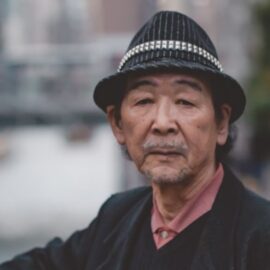

This article is an excerpt from the Shortform book guide to "The Courage to Be Disliked" by Ichiro Kishimi and Fumitake Koga. Shortform has the world's best summaries and analyses of books you should be reading.
Like this article? Sign up for a free trial here .
Does approval from others make you happy? Do you struggle to form healthy relationships? Do you think you may be chronically unhappy?
Someone who is chronically unhappy likely wants to be happy but is in the wrong mindset. Chronically unhappy people seek validation from others, set impossible goals that can’t be met, and sabotage their own relationships with toxic behavior.
Learn about the top three behaviors of chronically unhappy people so you can work to improve your mindset.
How Unhappy People Choose to See the World
According to Kishimi and Koga, there are two goals to choose from when it comes to our relationships with others: We can interact with others in hopes of either earning their approval or contributing positively to their lives. Chronically unhappy people choose the former, while happy people choose the latter.
(Shortform note: The concept that we should ideally interact with others without expecting their approval or anything else in return is a common idea—the 18th-century philosopher Immanuel Kant used it as the basis of his definition of universal morality. Among those who express this idea, Kishimi and Koga take an extreme stance, declaring it the basis of all lasting happiness.)
In this article, we’re going to examine the unhappy lifestyle that inevitably results from the goal of external approval. Afterward, we’ll take a look at the fulfilling lifestyle of someone who makes it their goal to help others unconditionally—the happy life available to you at any time.
1. Unhappy People Aim for External Approval
Kishimi and Koga argue that unhappy people make it their ultimate goal to earn the approval of others. In other words, unhappy people believe that the key to happiness is to be recognized as “good” by someone else. Kishimi and Koga make it clear that no matter who this external source of approval is—a teacher, a parent, society—the result is the same: unhappiness. Essentially, unhappy people all cling to the unhealthy belief that if others like you, it means you’re a “good person.”
Kishimi and Koga note that most unhappy people assume this need to be liked is an inescapable part of the human condition. Everyone craves approval, they think; it’s just how we’re built. These people have it backwards: Humans don’t crave approval because it makes us happy, approval makes us happy because we crave it.
External Approval Isn’t Worth Pursuing
Kishimi and Koga also note that even if unhappy people successfully earn the approval of others, they do so at great cost. By chasing approval, unhappy people ultimately end up living other people’s lives. Instead of pursuing their own goals, unhappy people follow the expectations of others, sacrificing their own desires (and happiness) in the process. For example, a young adult may decide to go to medical school to please their parents despite hating the idea of being a doctor.
| A Biological Need for Approval There is some evidence to dispute Kishimi and Koga’s claim that approval only makes us happy because we’ve chosen to want it. In Digital Minimalism, Cal Newport explains how humans are biologically predisposed to base their happiness on social approval. Unhappy people may not have chosen this goal at all—it’s a drive they’re born with. Neuroscientists have identified a set of regions in the brain that activates whenever you’re not concentrating on any specific task, which they named the “default network.” They discovered that the default network is the same network that activates when humans navigate social situations, indicating that unless we intentionally do otherwise, we’re constantly monitoring the status of our relationships with others. The default network lights up even in the brains of newborn babies, showing that social cognition is deeply rooted in our biology. Does this mean that Kishimi and Koga are wrong? Are we biologically driven to abandon what we really want and live the lives other people want us to? Not necessarily—unlike Newport, Kishimi and Koga make a distinction between the need for social approval and the need for positive social connection. As we’ll discuss in the final part of this guide, Kishimi and Koga would argue that it’s possible to satisfy our social needs through unconditional contribution to others instead of conditional approval from others. |
2. Unhappy People Must Cope With an Impossible Goal
We’ve established that external approval is ultimately unfulfilling. However, this isn’t the worst consequence of making approval from others your end goal.
Kishimi and Koga imply that the main problem with making approval from others your ultimate goal is that much of the time, this goal is impossible to achieve. In the majority of cases, approval is conditional—others will like you only if you do what they want you to do. This means that whether or not others approve of you is out of your control. Sometimes, there will be nothing you can do to get someone to like you.
After failing to achieve this impossible goal, unhappy people cope with their failure in two interconnected ways, which we’ll explore below.
Coping Mechanism #1: Avoiding the Impossible Goal
Kishimi and Koga explain that when faced with the often impossible task of earning the approval of others, unhappy people often cope by setting a new goal: to avoid trying and failing to earn the approval of others. Instead of pursuing the impossible goal, they choose not to try at all. As a result, they unconsciously manufacture negative emotions such as fear and self-loathing to avoid trying to win others’ approval.
3. Unhappy People Avoid Forming Healthy Relationships
Unhappy people’s need for external approval doesn’t just make them feel bad about themselves—it also actively prevents them from forming healthy relationships with others. Kishimi and Koga make it clear that as long as you’re trying to earn someone else’s approval, it’s impossible to forge a mutually satisfying relationship with them.
(Shortform note: In Attached, Amir Levine and Rachel Heller offer a counterargument: Not only is it possible to forge fulfilling romantic relationships without abandoning a dependence on external approval, healthy relationships require a constant stream of mutual approval and support. Levine and Heller argue that we’re only able to reach our full potential as independent individuals if we have a “secure base” of a loved one’s reliable approval.)
The authors argue that seeking approval from others disrupts your relationships for two reasons. Let’s explore each in detail.

———End of Preview———
Like what you just read? Read the rest of the world's best book summary and analysis of Ichiro Kishimi and Fumitake Koga's "The Courage to Be Disliked" at Shortform .
Here's what you'll find in our full The Courage to Be Disliked summary :
- Why you care too much about what other people think of you
- How to tap into the freedom and joy inherent in human existence
- How to overcome trauma from your past






